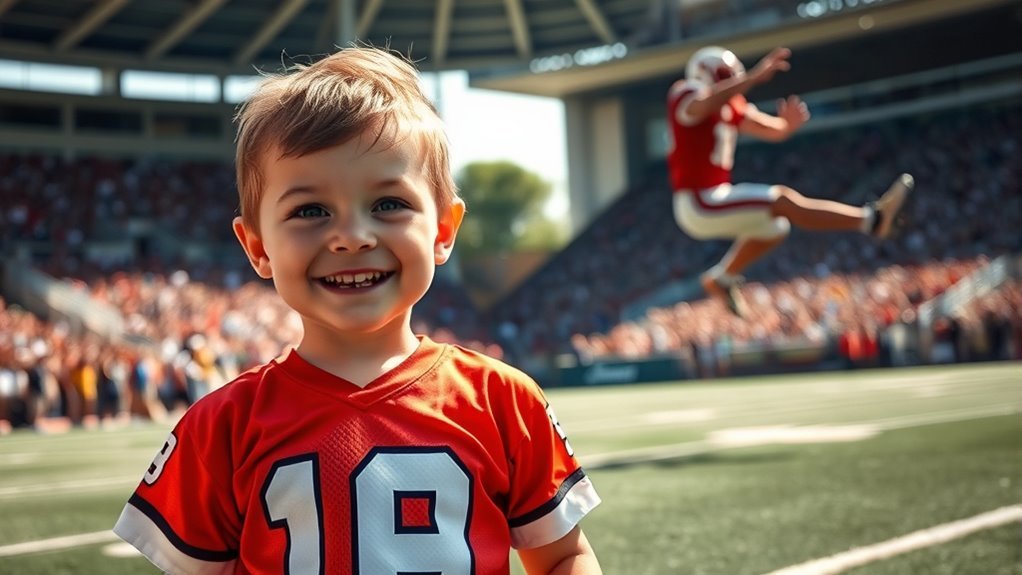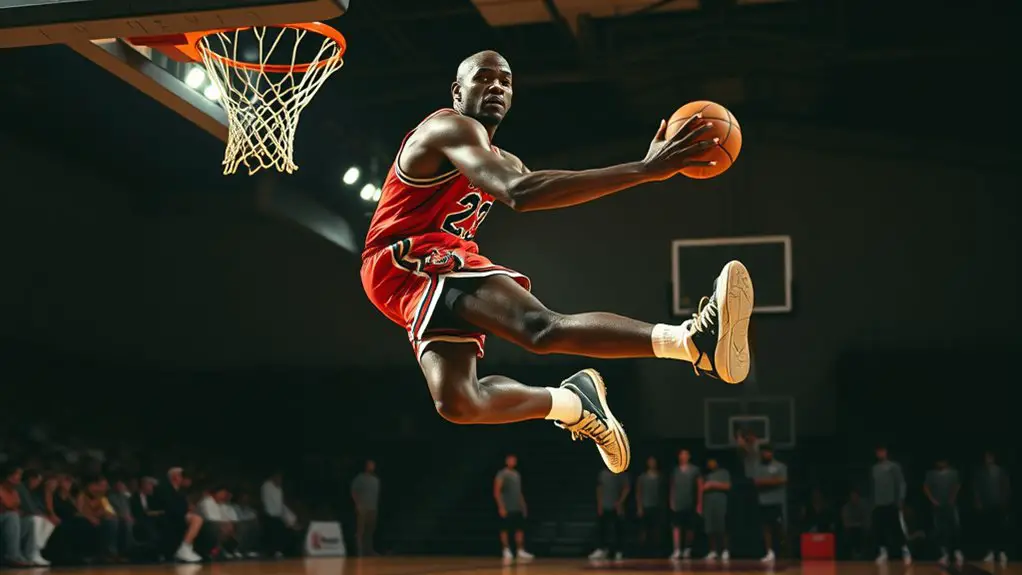Yes, athletes can be role models. They inspire you with their dedication, healthy lifestyles, and commitment to social change. However, their actions—both positive and negative—shape public perception. While many athletes advocate for important issues, some face scrutiny for controversial decisions. Coaches and mentors play an essential role in guiding athletes, fostering accountability among teams. Balancing athleticism with morality is key to their influence. Explore how these dynamics impact the perception of athletes as role models.
The Definition of a Role Model
A role model is someone whose behavior, attitudes, and achievements inspire others to endeavor for similar success. You might find that true role models possess strong character traits like integrity, resilience, and empathy. These qualities help them navigate not just their personal journeys but also the societal expectations that often weigh heavily on individuals. By breaking free from these constraints, they encourage you to do the same, showing that you don’t have to conform to what others think you should be. When you look up to a role model, you’re reminded that freedom comes from embracing your unique path and values. Their influence can push you to pursue your passions and stand tall against societal norms, ultimately leading to your own success. Additionally, many athletes exemplify mental strength in overcoming setbacks, demonstrating that resilience can inspire others to face their own challenges.
The Positive Influence of Athletes
Athletes can have a powerful impact on young people, inspiring them to get involved in sports and physical activity. By promoting healthy lifestyles, they set examples that encourage better choices. Plus, many use their platforms to advocate for social change, showing that their influence extends beyond the field. Their dedication to preparation and practice not only enhances their performance but also serves as a model for young athletes striving to improve.
Inspiring Youth Participation
When young people see their favorite sports figures excelling on and off the field, it sparks a desire to participate in athletics themselves. Athletes serve as beacons of hope, encouraging youth engagement and showing them the power of hard work and dedication. Their journeys highlight that anyone can achieve greatness, inspiring a new generation to chase their dreams.
| Athlete | Impact on Youth | Key Inspiration |
|---|---|---|
| LeBron James | Community building | Leadership |
| Serena Williams | Breaking barriers | Resilience |
| Lionel Messi | Pursuing passion | Perseverance |
| Simone Biles | Mental health awareness | Authenticity |
| Tom Brady | Commitment to excellence | Determination |
This positive influence can create lasting change in young lives.
Promoting Healthy Lifestyles
Many people look up to athletes not just for their skills, but for their commitment to healthy living. When you see these role models prioritizing nutrition education and fitness awareness, it can inspire you to make better choices in your own life. Athletes often share their workout routines and meal plans, encouraging fans to embrace a lifestyle that values health and well-being. They demonstrate that being fit isn’t just about looks; it’s about feeling good and living freely. By promoting healthy habits, athletes can spark a movement, helping you understand the importance of balance in your life. With their influence, you’re reminded that a commitment to health can lead to greater freedom and fulfillment.
Advocating Social Change
In addition to promoting healthy lifestyles, athletes often take a stand on social issues, using their platforms to advocate for change. You see, many athletes understand the power they hold and leverage it for social justice. They challenge inequality and inspire you to join the fight for a better world. By speaking out against racism, poverty, and discrimination, they’re not just athletes; they’re leaders. Their advocacy pushes you to think critically about societal issues and encourages you to take action. When athletes share their stories and support movements, they empower you to believe that change is possible. Embracing their influence means recognizing that your voice can also be a catalyst for social justice, creating a ripple effect of positive change.
The Impact of Social Media
In today’s world, social media plays a huge role in shaping how young fans view their favorite athletes. You might notice how these athletes influence youth behavior, whether positively or negatively, just by what they post online. It’s essential to reflect on the responsibility they hold in using their platforms wisely. As athletes engage with their audience, they can also promote mindfulness and relaxation techniques that help their fans manage performance anxiety in sports and daily life.
Influence on Youth Behavior
There’s no denying that social media has transformed how athletes connect with their fans, especially the younger generation. With just a swipe or a click, you can follow your favorite athlete, gaining insight into their lives and values. This direct line fosters youth engagement, inspiring you to emulate their dedication and passion. Athletes often serve as mentors, sharing their journeys and lessons learned, which can motivate you to pursue your dreams. However, it’s important to remember that not everything you see online is reality. You might find a mix of authenticity and curated content that shapes your perspective. As you navigate this digital landscape, consider how these influences impact your own behavior and aspirations, aiming for authenticity in your choices.
Social Media Responsibility
Athletes wield significant influence on social media, carrying a responsibility that extends beyond just their performance on the field. With their vast platforms, they shape opinions and inspire countless fans. This influence requires a keen understanding of social media ethics; what they post can impact their image and the values they represent. Think about athlete branding—it’s not just about endorsements but also about the messages they convey. When athletes engage responsibly, they set a positive example, fostering a culture of respect and integrity. By sharing authentic stories and advocating for social issues, they can inspire their followers to take action and think critically. Ultimately, it’s about using their voice wisely to promote freedom and positive change in society.
Controversial Actions and Their Consequences
While some athletes inspire millions, their controversial actions can overshadow their achievements and lead to significant consequences. When you look at their behavior, it’s clear that actions speak louder than words. Controversial behavior, whether it’s off-field incidents or political statements, can spark intense public backlash. Fans who once admired these athletes might turn away, questioning their integrity. This backlash not only affects their personal brand but can also impact endorsements and team dynamics. You might find it disheartening to see someone you looked up to falter. Ultimately, it’s a reminder that fame comes with responsibilities. Athletes should consider the weight of their choices, as their actions can ripple through society, influencing young fans who see them as role models.
The Role of Coaches and Mentors
Controversial actions by athletes often highlight the need for strong guidance in their careers. Coaches and mentors play an essential role in shaping athletes, helping them thrive both on and off the field. Here are some key aspects of their influence:
Controversial actions underscore the vital role of coaches and mentors in guiding athletes to success on and off the field.
- Coaching Techniques: Effective methods can empower athletes to reach their full potential.
- Mentorship Programs: These initiatives foster personal growth and resilience.
- Building Character: Strong mentors instill values like respect and teamwork.
- Emotional Support: Coaches offer guidance during challenging times, helping athletes navigate pressures. Additionally, coaches can teach athletes various mental preparation techniques that are crucial for managing stress during competition.
The Importance of Accountability
Accountability is essential in the world of sports, not just for athletes themselves but also for their coaches and mentors. When you hold yourself and others responsible, it fosters trust and integrity. Here’s a snapshot of how accountability measures can manifest in sports:
| Accountability Measure | Description | Impact on Performance |
|---|---|---|
| Self-Assessment | Regularly evaluating your performance | Encourages personal responsibility |
| Team Meetings | Open discussions on goals and challenges | Builds collective accountability |
| Peer Feedback | Constructive criticism among teammates | Enhances trust and growth |
| Performance Reviews | Analyzing outcomes of games | Identifies areas for improvement |
| Goal Setting | Establishing clear, measurable goals | Provides direction and focus |
Incorporating rest days into training routines can also enhance accountability by allowing athletes to recover and perform at their best. Embracing these practices fosters a culture of accountability, empowering everyone involved to rise to their best selves.
The Responsibility of Fans
Fans play an essential role in shaping the culture of sports, as their behavior and attitudes can greatly influence athletes and the broader community. Your expectations as a fan can drive athlete accountability, creating a positive environment. Here are some responsibilities you hold:
- Support Positive Behavior: Cheer for athletes who demonstrate good sportsmanship and integrity.
- Constructive Feedback: Offer criticism that’s fair and aimed at improvement, not just negativity.
- Promote Inclusivity: Encourage diverse voices and perspectives in sports.
- Engage Thoughtfully: Share your views on social media in a way that fosters discussion rather than hostility.
Additionally, surrounding yourself with supportive people can inspire athletes to maintain a winning mindset and strive for excellence.
Balancing Athleticism and Morality
While the thrill of athletic excellence often captivates audiences, it’s essential to recognize the moral dilemmas athletes face in their pursuit of success. Balancing athleticism with morality can be challenging, especially when performance pressure mounts. Athletes must navigate ethical dilemmas that can compromise their integrity and the values they represent.
| Ethical Dilemmas | Performance Pressure |
|---|---|
| Cheating for victory | Expectations to win |
| Substance abuse | Sponsorship demands |
| Ignoring community impact | Media scrutiny |
You might find it liberating to reflect that athletes, like everyone else, are human. They’re often torn between personal aspirations and the broader implications of their choices, reminding us that morality should never take a backseat to ambition. Developing mental toughness can help athletes make ethical decisions, even under pressure.
Frequently Asked Questions
Do All Athletes Want to Be Role Models?
Not all athletes want to be role models. While some embrace the responsibility, others might feel pressured by public expectations. It’s important to recognize that athlete intentions vary greatly; many just want to excel in their sport without the added burden of being a public figure. Ultimately, you should appreciate their achievements without imposing your ideals on them. Freedom to choose their path is what every athlete deserves, regardless of their role model status.
Can a Single Mistake Ruin an Athlete’s Reputation?
Yes, a single mistake can definitely ruin an athlete’s reputation. Public perception is quick to shift, and one misstep can overshadow their achievements. It’s all about the lasting impact of their actions; fans and the media often focus on that moment rather than the athlete’s entire career. You might find that even a small error can lead to a significant loss of respect, showing how fragile an athlete’s reputation can be.
How Do Cultural Differences Affect Role Model Perceptions?
Cultural values paint the canvas of our perceptions, making role models as varied as colors in a sunset. You might see an athlete as a hero, while someone from a different background views them through a lens of skepticism. This perception diversity shapes how you connect with their journey. If you embrace this freedom to understand differing viewpoints, you’ll discover that role models can be as unique as the cultures we come from.
Are Athletes Held to Higher Standards Than Non-Athletes?
Yes, athletes are often held to higher standards than non-athletes. You’re likely aware that with their fame comes immense public scrutiny. People expect athletes to not only excel in their sport but also to embody good values and behavior. This pressure can be overwhelming, as their actions are constantly analyzed. While everyone makes mistakes, the expectations placed on athletes can feel much more intense, given their visibility and influence.
What Role Does Sponsorship Play in an Athlete’s Image?
Sponsorship impacts an athlete’s image like a spotlight on a stage, highlighting their strengths and sometimes overshadowing their flaws. When brands align with you, it can shape public perception, making you seem more successful or relatable. However, this relationship can also pressure you to maintain a certain persona, which might not reflect your true self. Balancing authenticity with sponsorship expectations is key to steering your image in the competitive sports world.



